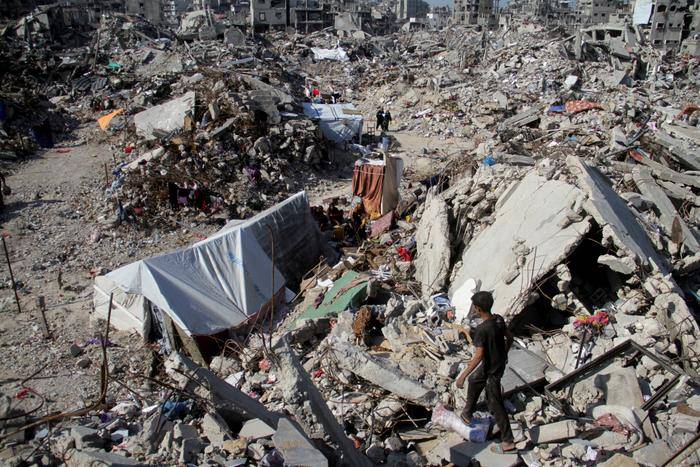A Desperate Situation: The Humanitarian Crisis in Gaza Takes a Devastating Toll
The Gaza Strip, a coastal region in the Middle East, has been embroiled in a decades-long conflict that has left its residents in a state of perpetual desperation. The humanitarian crisis in Gaza has reached catastrophic levels, with many residents struggling to access basic necessities like food, water, and medical care.
The situation in Gaza is complex and multifaceted, with various factors contributing to the crisis. The Israeli blockade, which has been in place since 2007, has severely restricted the flow of goods and people in and out of Gaza. This has led to widespread poverty, unemployment, and food insecurity.
The blockade has also had a devastating impact on Gaza's healthcare system. Medical supplies and equipment are in short supply, and many hospitals and clinics are struggling to provide even basic care. The situation is particularly dire for patients in need of specialized treatment, such as cancer care or dialysis.
In addition to the blockade, Gaza has also been affected by repeated conflicts between Israel and Hamas, the militant group that governs Gaza. These conflicts have resulted in widespread destruction and loss of life, further exacerbating the humanitarian crisis.
Despite the dire situation, many Gazans are finding ways to cope and adapt. Some have turned to innovative solutions, such as using solar panels to generate electricity or creating makeshift greenhouses to grow food. Others have formed community organizations to provide support and services to those in need.
However, even these efforts are often hindered by the blockade and the lack of resources. Many Gazans are forced to rely on international aid, which can be unreliable and subject to political pressures.
The humanitarian crisis in Gaza has also had a profound impact on the mental health of its residents. Many Gazans are struggling with anxiety, depression, and post-traumatic stress disorder (PTSD), as a result of the ongoing conflict and blockade.
In recent years, there has been a growing recognition of the need to address the humanitarian crisis in Gaza. In 2020, the United Nations launched a major appeal for funding to support humanitarian efforts in Gaza. The appeal highlighted the need for urgent action to address the crisis, including the provision of food, shelter, and medical care.
However, despite these efforts, the situation in Gaza remains dire. The blockade continues to restrict the flow of goods and people, and the conflict between Israel and Hamas remains unresolved.
In the face of this desperation, many Gazans are finding ways to hold on to hope. Some are turning to art and music as a way to express themselves and cope with the trauma they have experienced. Others are forming community organizations to provide support and services to those in need.
While these efforts are important, they are not enough to address the scale of the humanitarian crisis in Gaza. Urgent action is needed to address the root causes of the crisis, including the blockade and the conflict between Israel and Hamas.
Until then, the people of Gaza will continue to struggle to survive in a desperate situation. As one Gazan resident put it, "Hope is all we have left. But even hope can be a luxury we can't afford."
The blockade of Gaza has had a devastating impact on the lives of its residents. The restrictions on the flow of goods and people have led to widespread poverty, unemployment, and food insecurity.
One of the most affected groups is the children of Gaza. According to UNICEF, over 90% of children in Gaza live in poverty, and many are forced to work to support their families. The blockade has also led to a shortage of educational materials and equipment, making it difficult for children to access quality education.
The blockade has also had a profound impact on the healthcare system in Gaza. Medical supplies and equipment are in short supply, and many hospitals and clinics are struggling to provide even basic care. The situation is particularly dire for patients in need of specialized treatment, such as cancer care or dialysis.
In addition to the physical toll, the blockade has also had a profound impact on the mental health of Gazans. Many residents are struggling with anxiety, depression, and PTSD, as a result of the ongoing conflict and blockade.
The international community has been slow to respond to the humanitarian crisis in Gaza. While there have been some efforts to provide aid and support, much more needs to be done to address the root causes of the crisis.
In recent years, there has been a growing recognition of the need to address the humanitarian crisis in Gaza. In 2020, the United Nations launched a major appeal for funding to support humanitarian efforts in Gaza. The appeal highlighted the need for urgent action to address the crisis, including the provision of food, shelter, and medical care.
However, despite these efforts, the situation in Gaza remains dire. The blockade continues to restrict the flow of goods and people, and the conflict between Israel and Hamas remains unresolved.
It is clear that urgent action is needed to address the humanitarian crisis in Gaza. The international community must come together to provide support




No comments yet
Be the first to share your thoughts!